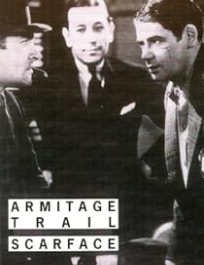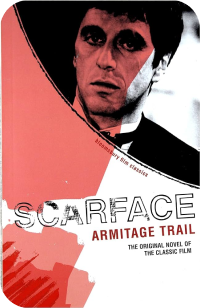Behind every great film there is a book: Scarface by Armitage Trail
Everyone knows the film classic Scarface, but is it as faithful to the book?

Armitage Trail “Scarface” book (1929)
Publié par Matthis Boreaniz (Montbéliard) le 24/10/2023
Lecture : 5 minutes
In the realm of American literature, the year 1930 witnessed the emergence of a groundbreaking novel that would come to define an entire genre. "Scarface" by Armitage Trail captured the essence of the tumultuous era of Prohibition in Chicago, delving into the murky world of crime, power, and ambition. At its heart lies the enigmatic figure of Antonio "Tony" Camonte, known as "Scarface" owing to a prominent facial scar, whose journey through the underworld of Chicago remains etched in the annals of literary history.
The plot
Trail's narrative craftsmanship navigates through the labyrinthine criminal landscape, where Camonte, of Italian heritage, maneuvers through the complex web of power dynamics and survival strategies. The readers are drawn into a world that explores not just the external chaos of crime-ridden Chicago but also the internal conflicts and psychological complexities of the characters that populate it.

The themes and the complexity of Camonte
"Scarface" goes beyond being a mere crime novel; it delves into profound thematic explorations of human nature. Trail fearlessly peels back the layers of the human psyche, laying bare the vulnerabilities and flaws that surface in the pursuit of power and wealth. Camonte's character becomes the canvas on which Trail paints a complex portrait of ambition, morality, and the human capacity for both darkness and redemption.
A thought-provoking book
The novel serves as a powerful reflection of the social realities of its time. It unveils the underbelly of the American Dream, exposing the disillusionment and moral decay that can fester in the pursuit of material success. Trail's nuanced portrayal of the criminal underworld becomes a microcosm of the societal struggles and aspirations prevalent during the Prohibition era, making "Scarface" not just a story of gangsters but also a social commentary on the human condition. Through the intricate interplay of loyalty, betrayal, and moral ambiguity, the novel illustrates the intricacies of human relationships within the criminal underworld. The juxtaposition of power and vulnerability, ambition and downfall, serves as a poignant reminder of the fragile balance that governs human interactions in the midst of lawlessness and chaos.
Debates and controversies
In its reception, "Scarface" provoked both acclaim and controversy. Some lauded its unflinching realism and gritty portrayal of the criminal world, while others criticized its stark depiction of violence and its unapologetic exploration of the darker aspects of human nature. However, its impact on American literature remained undeniable, solidifying its place as a classic in the realm of noir fiction. Decades later, "Scarface" continues to resonate with readers and scholars, serving as a timeless exploration of the human psyche and the allure of power. It stands as a testament to the enduring power of literature to not only entertain but also to provoke introspection and contemplation on the complexities of human existence.
Matthis Boreaniz MMI1/B1 : matthis.boreaniz@edu.univ-fcomte.fr
